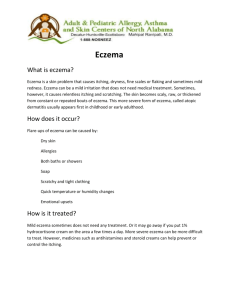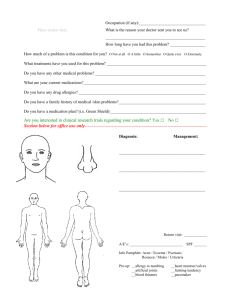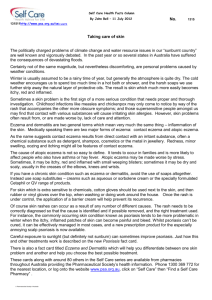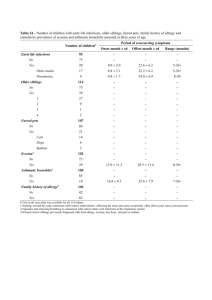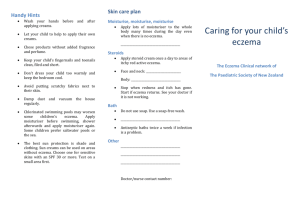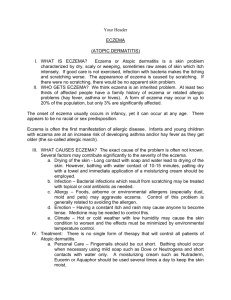Caring for your child`s eczema
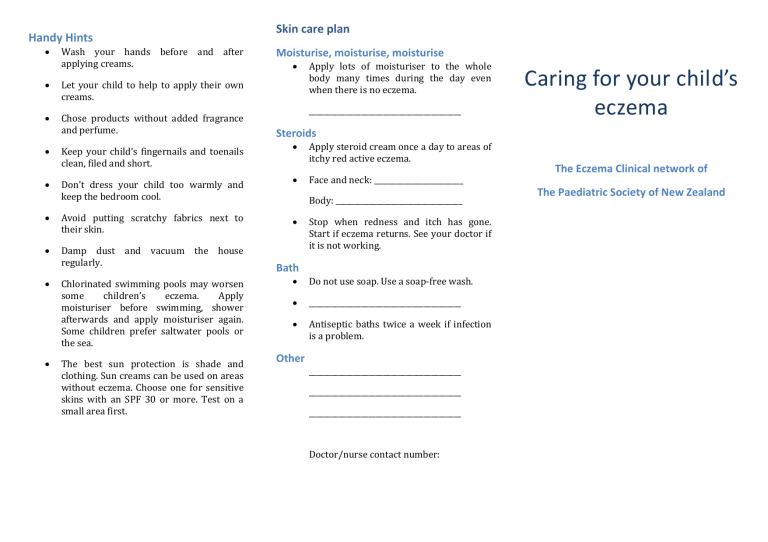
Handy Hints
Wash your hands before and after applying creams.
Let your child to help to apply their own creams.
Chose products without added fragrance and perfume.
Keep your child’s fingernails and toenails clean, filed and short.
Don’t dress your child too warmly and keep the bedroom cool.
Avoid putting scratchy fabrics next to their skin.
Damp dust and vacuum the house regularly.
Chlorinated swimming pools may worsen some children’s eczema. Apply moisturiser before swimming, shower afterwards and apply moisturiser again.
Some children prefer saltwater pools or the sea.
The best sun protection is shade and clothing. Sun creams can be used on areas without eczema. Choose one for sensitive skins with an SPF 30 or more. Test on a small area first.
Skin care plan
Moisturise, moisturise, moisturise
Apply lots of moisturiser to the whole body many times during the day even when there is no eczema.
_________________________________________
Steroids
Apply steroid cream once a day to areas of itchy red active eczema.
Face and neck: ________________________
Body: __________________________________
Stop when redness and itch has gone.
Start if eczema returns. See your doctor if it is not working.
Bath
Do not use soap. Use a soap-free wash.
_________________________________________
Antiseptic baths twice a week if infection is a problem.
Other
_________________________________________
_________________________________________
_________________________________________
Doctor/nurse contact number:
Caring for your child’s eczema
The Eczema Clinical network of
The Paediatric Society of New Zealand
What is eczema
Skin with active eczema becomes dry, red, itchy and inflamed. It can easily get infected. Eczema can affect any part of the body and can change a lot from day to day.
Eczema can usually be controlled by good skin care and avoiding triggers. The treatment your child needs will change with time. A few children still have bad eczema despite good care and need specialist review.
Triggers
Skin with eczema is more likely to be irritated by things in the environment. These triggers may include:
Soap and detergent
Infections
Dust, house dust mites, pet fur
Overheating
Food allergy can occur in children with eczema, however removing foods usually does not improve eczema. See your doctor for assessment if you are concerned.
Infection
Infection is the most common cause of flares of eczema. Infected eczema may be bright red, weeping and crusted. See your doctor for antibiotic treatment.
The cold sore virus can cause severe painful infection – avoid contact with cold sores. See your doctor if infection occurs.
Skin care
Good skin care with appropriate creams and ointments is very important.
Baths
Bath every day in warm (not hot) water for up to
10 minutes. Twice a day during flares.
DO NOT USE SOAP. Use a soap substitute, moisturiser or soap-free wash and rinse well. A bath oil can help moisturize the skin.
Shampoo should be rinsed off over a basin or at the end of the bath.
After the bath pat the skin dry, do not rub. Do not share towels. Now apply creams.
Antiseptic baths twice a week can help prevent infection and improve eczema. Rinse off with water afterwards. Janola brand has detergent and is not recommended. Use one of these plain household bleaches or bath oils:
Budget (Regular) -add 2ml to 1 Litre of bathwater. This is about 1 cup to a 20cm deep adult bath, 4 caps to a full baby’s bath.
Budget (Extra Strength) or Homebrand
(Regular Bleach) –add 1ml to 1 Litre. This is about ½ cup to a 20cm deep adult bath,
2 caps to a full baby’s bath.
Antiseptic bath oils (Oilatum plus or QV
Flare up) can be used instead but are not funded. Follow the instructions on the bottle.
Moisturisers (Emollients)
Moisturisers should be applied many times a day
– the more often the better. Apply
Allow to soak in.
generously all
over and smooth in the direction of hair growth.
Regular use of moisturisers reduces the need for steroid creams. Aim to use a 500g tub every 2-4 weeks, and a lot more during flares.
Do not put your hands into tubs of cream as this can introduce infection. Instead spoon out the amount you need onto a clean dish or tissue or decant into a clean pump bottle.
Steroid creams
Apply steroid creams once a day to all areas with active eczema - inflamed, red and itchy skin. Don’t wait for the eczema to get really bad before you use steroids. Eczema needs steroid creams to improve – these are very safe and effective when used correctly.
Apply steroid creams immediately after the bath, before or after moisturising. Apply a thin layer to make the skin shine.
When eczema is not active (not red and itchy) stop using the steroid cream and continue to moisturise. Restart steroids whenever eczema comes back.
See your doctor/nurse
If eczema is infected – weeping, yellow crusts, painful
If the eczema doesn’t go away with using steroids everyday for 2 weeks
If steroids creams are needed most days of most weeks
If your child is not sleeping or missing school because of eczema
